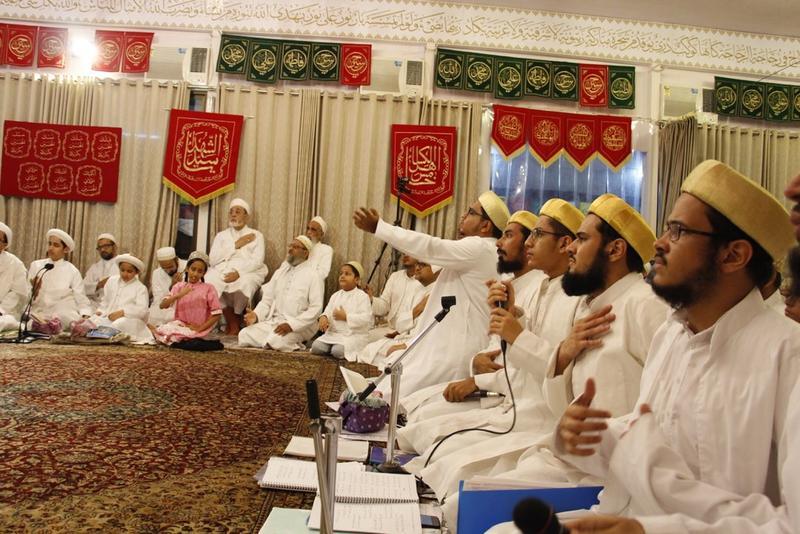Summary and Photos - 5th Waaz Syedna Taher Fakhruddin TUS
08 October 2016
On 6th Moharram, Syedna Fakhruddin TUS delivered the 5th waaz for Ashara 1438H. Maulana began the bayaan by explaining Imam Tayyeb’s kunyat is Abul-Qasim, just as Rasullulah’s SA kunyat is Abul-Qasim. Syedna al-Moayyad al-Shirazi states that an Imam is present in every age who personifies rahmat (Allah’s mercy), and in satr, the Dai is among Mumineen as the personification of rahmat. Syedna Ali ibn Mohammed al-Walid (5th Dai) expresses in a qasida addressed to Syedna Hatim (3rd Dai) “we do not say that Imam-uz-zaman is in seclusion, when you, O rahmat-ur-rahman, our Dai, are present among us.” Du’aat Kiraam have such shaan that Rasulullah, during Hijjat-ul-Wada near Hajar al-Aswad said in reference to the Du’aat that, “I yearn to see my brothers.” Ashaab arazed to Rasullulah that, “are we not your brothers?” Rasulullah responded, “you are my Ashaab while they are brothers. Du’aat, who establish Dawat towards the end of the zamaan (age).” Maulana Mohammed Burhanuddin often used to say in waaz that we pray namaaz as Rasulullah did. After Maulana Taher Saifuddin’s wafaat, Syedna Burhanuddin visited Misr and led namaaz at Jame Azhar, the shaykh of Al-Azhar also prayed with Maulana and commented to Syedna Qutbuddin that “today, I felt as if I prayed with Rasulullah.” Maulana continued with the riwayat (episode) where Imam Jafar-us-Sadiq does nawazish (favors) on Shia: “May Allah grant you the rizq of Mohammed’s murafaaqat (companionship), may He grant you to drink from his hauz (pond).”
Since the day was jumoa (Friday), Maulana prayed salawaat on our mawali. Maulana noted how the whole world agrees on the days of the week, and that there are 7 days in a week. It is rare for billions of people to agree on one thing, this is due to the very first Imam (Adam-e-Kulli) who established this. Each day is masl (symbol) on a natiq (Prophet) and Friday is a mathal on Rasulullah SA.
Syedna Fakhruddin prayed salaam on Anbiyaa’ Kiraam, Aimmat Tahereen, Aale Mohammed Du’at Mutlaqeen and did doa that we may be fortunate to do their ziarat soon - he stated that through our salaam on Imam-uz-Zaman all our previous salaams are qabool (accepted). Similarly, Jamnagar, Surat, Mandvi, wherever Du’aat are madfoon, may our salaam reach them. And especially, Taher Saifuddin Aqa’s qabr, we long to visit and pray salaam. Qutbuddin Maula's qabr is nearby and our voices is reaching there, his nazaraat continue to flow from Jannat towards those who maintain his mohabbat. May Khuda Ta’ala grant tawfeeq and yari, make it possible for us to build Qutbuddin Maula’s qubba, one of such shaan that the stars would be envious, we take refuge in him, we do his ziarat and all other ziarats are qabool, this is our niyyat (intention),
Maulana then began the main bayaan, relating the daur (age) of the previous 5 natiq-s to the daur of Rasulullah. Maulana recited and explained the ayat “There was certainly in their stories a lesson for those of understanding. Never was the Qur'an a narration invented, but a confirmation of what was before it and a detailed explanation of all things and guidance and mercy for a people who believe” (Surat Yusuf: 111). The stories of past anbiya are not just to please the heart, they are true and hidayat (guidance) for those who believe. Syedna al-Moayyad al-Shirazi states that what occurred in past ages has occurred in Rasulullah’s age, not just stories but relevant today. With great detail, Syedna Fakhruddin explained the historical parallels between these Anbiya, Rasullulah SA and the current zamaan. In each bayaan Syedna also related zikr of Syedna Qutbuddin’s shaan.
Maulana prayed hamd ibarat from Maulana Taher Saifuddin risalat “Massartul Fathil Mubeen” and recited the bayt “Salla Ala Mohammedin Rabbohu”. Maulana narrated Husain Imam’s shahadat and Umme Salama’s zikr who was given mitti of Karbala by Rasulullah, which turned blood red at the time of Husain’s shahadat. Maulana ended the waaz on Rasulullah’s shahadat, and especially recounted the zikr of hanoot, which all Panjetan were given, except for Aqa Husain.








